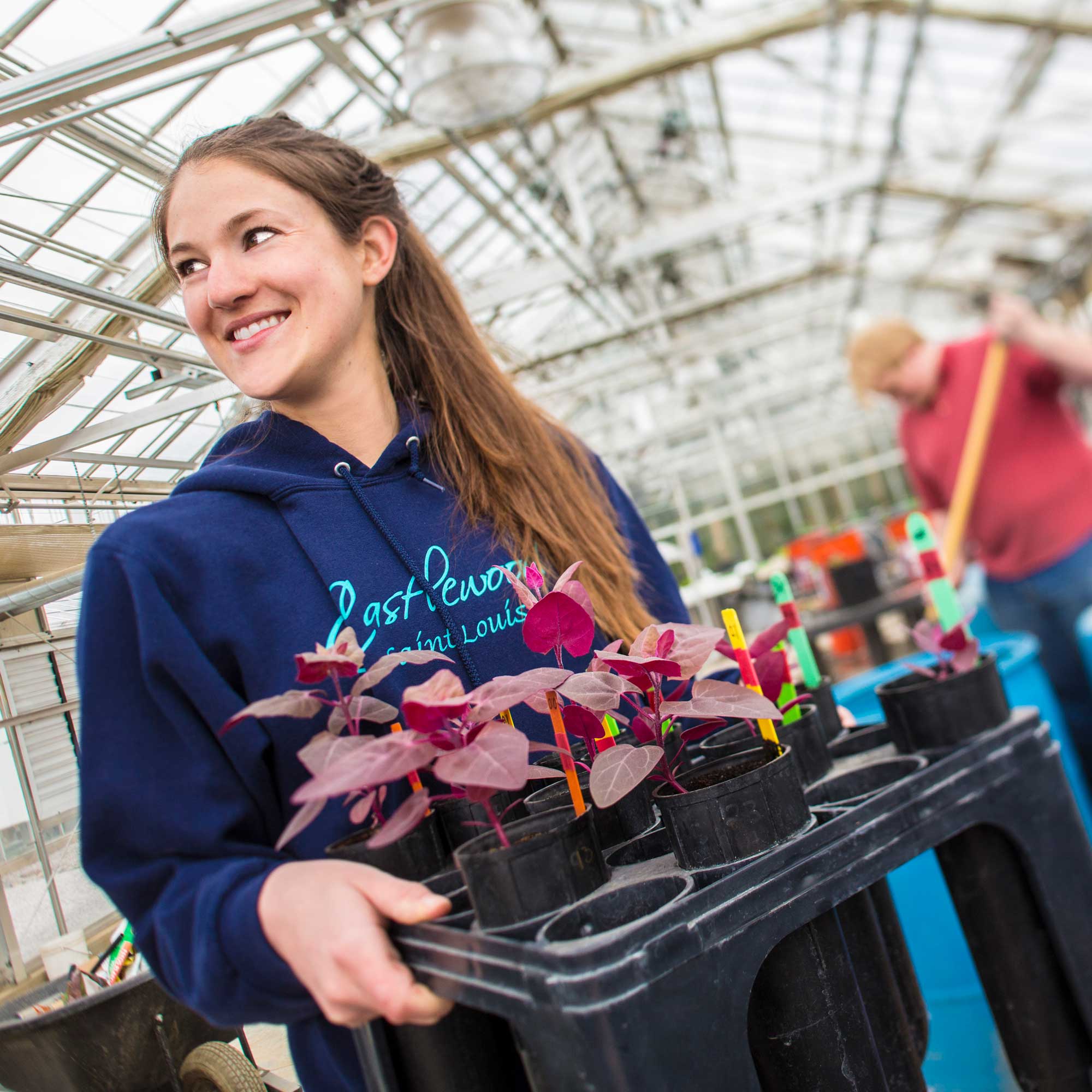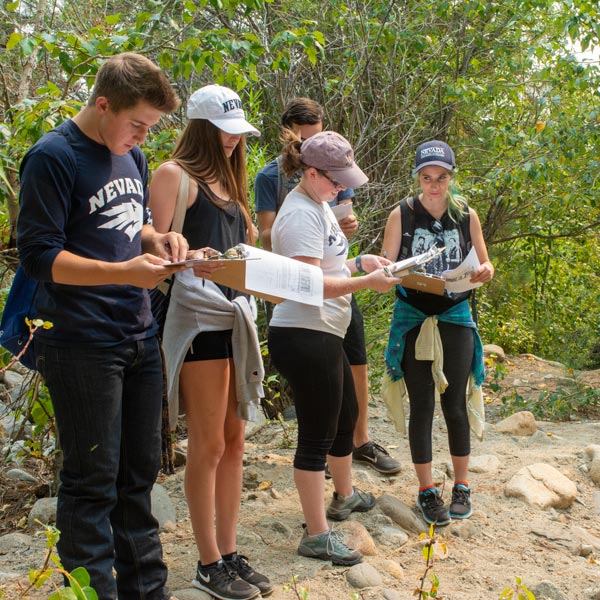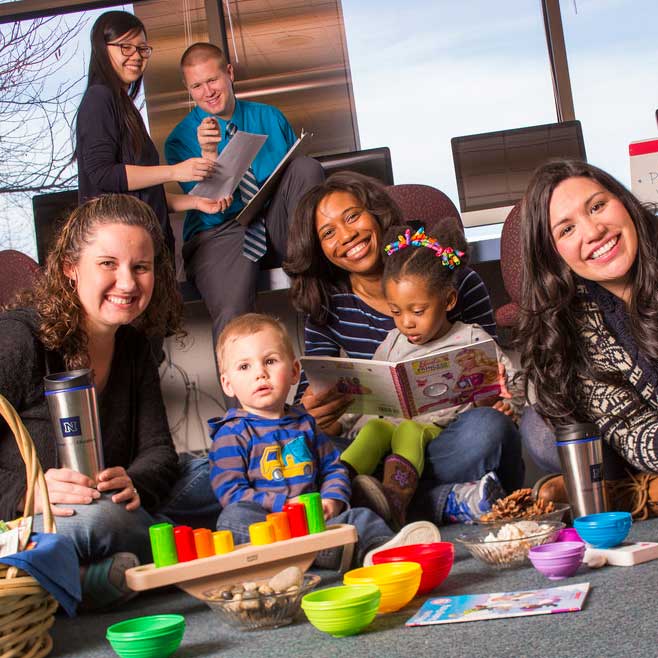About our College
A founding college of the University, we have a long tradition of excellence in teaching, research and engagement programs that benefit the health and economic vitality of Nevada. We offer programs in:
- agriculture, horticulture, rangeland & veterinary sciences
- biochemistry & molecular biology
- children, youth & families
- community & economic development
- health & nutrition
- natural resources & environmental science
Will work for gluten-free beer
Researchers’ attention turns to sorghum for brewing
Emma Schmitz, Edible Reno-Tahoe
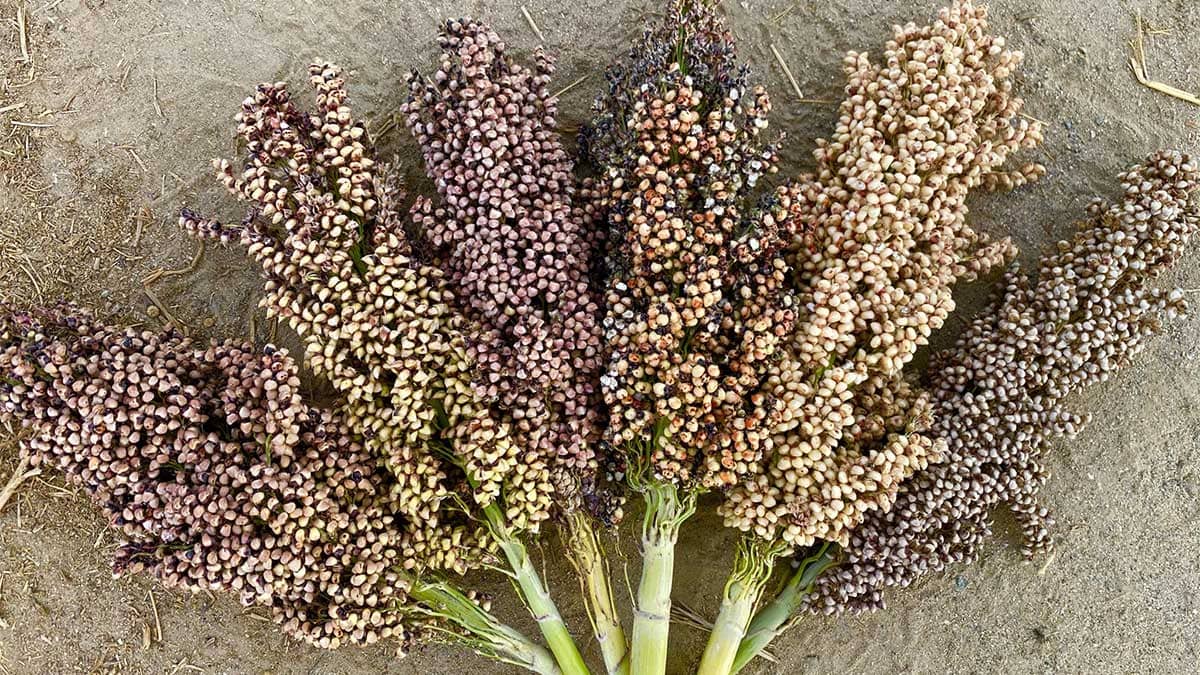 A bouquet of some of the specialty grain sorghum varieties being developed in Yerka’s breeding program. Photo by Melinda Yerka.
A bouquet of some of the specialty grain sorghum varieties being developed in Yerka’s breeding program. Photo by Melinda Yerka.
Bread, cereal, spaghetti, snack bars. What do these food items have in common? Grain, which typically constitutes a nightmare for gluten-sensitive eaters. Thankfully, modern food scientists have discovered many gluten-free substitutes that commonly have a base of sorghum, a naturally gluten-free variety of grain from the grass family. And while parts of the world such as Asia have a long history of using sorghum for spirits, American brewers are just getting started with this consumer-friendly base for making 100% gluten-free beer.
The absence of gluten in sorghum is one of many reasons to use it instead of barley. Growers can produce more of the grassy grain per acre compared to barley fields while using less water than corn, and beef cattle can feed on the leftover stalks after harvest during the winter. The health and sustainability benefits of sorghum are why University researchers Melinda Yerka, an assistant professor, and John Baggett, a soon-to-graduate biochemistry Ph.D. candidate and research assistant, started the College's sorghum-breeding program.
The researchers have identified a specific hybrid that tastes better than other varieties — a very important aspect of beer-making. Research in the next year or two will hopefully reveal why that is. Consumers should be able to taste test the University-grown sorghum at The Depot Craft Brewery and Distillery in Reno within the next few years.
Sorghum discussed as low-water alternative crop for Nevada at virtual workshop
Tiffany Kozsan
Maninder Walia, assistant professor and field crop specialist with the College’s Extension unit, organized a free virtual workshop, "Sorghum for Nevada: Basics and Research Updates," March 12.
Presenters included Walia, as well as Assistant Professor Melinda Yerka, Assistant Professor Alejandro Andrade-Rodriguez and Associate Professor Robert Washington-Allen, all with the College’s Experiment Station unit.
Meet our sorghum researchers

Maninder Walia
Walia works with both researchers and local producers to test new crop varieties to enhance agricultural productivity and environmental sustainability by adopting strategies such as soil amendments, reduced or no-tillage, alternate cropping systems, cover crops, and nutrient management strategies to improve crop and soil quality.
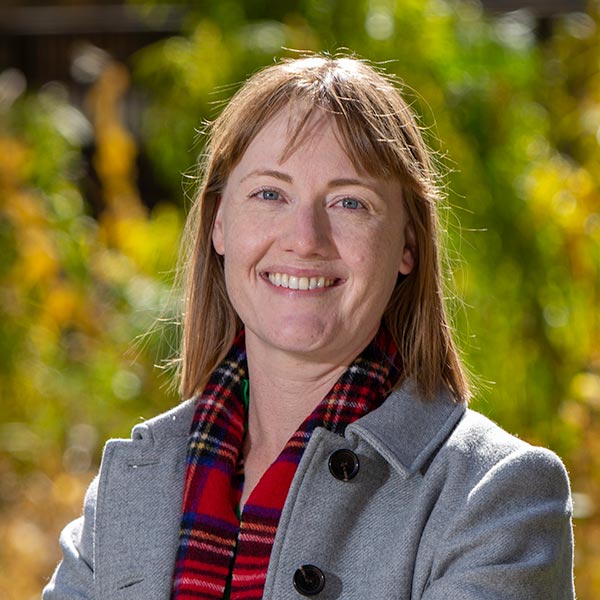
Melinda Yerka
Yerka has been studying sorghum and other alternative crops since before she joined the College in 2017. Her sorghum breeding program is developing varieties specifically tailored for commercial production in northern Nevada and California.
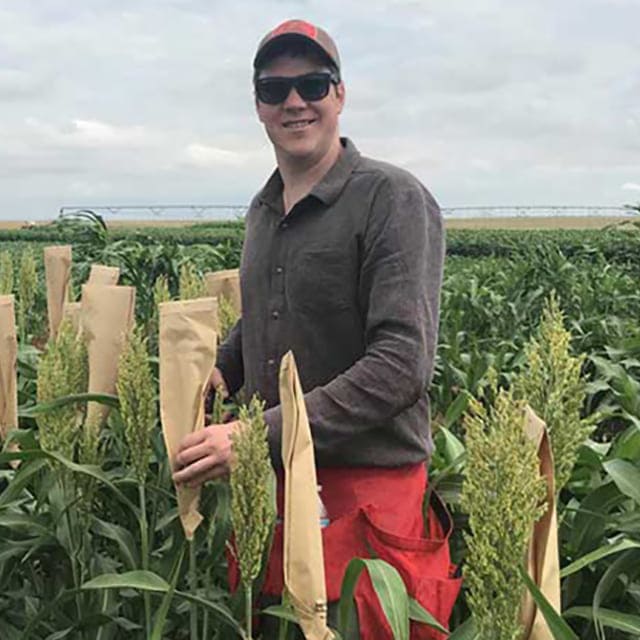
John Baggett
Baggett, a biochemistry Ph.D. candidate, studies the biochemistry of fermentation and works in Yerka's sorghum breeding program. Previously, he conducted research and development with barley-based beer recipes at The Depot Craft Brewery and Distillery in Reno.
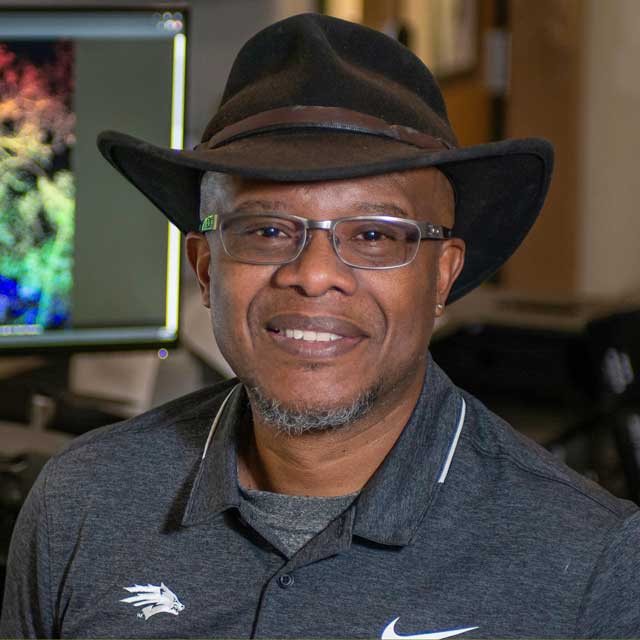
Robert Washington-Allen
Washington-Allen studies how to apply innovative technology, including drones, laser scanning, ground-penetrating radar, virtual and augmented reality tools, geographic information systems, and remote sensing, to improve crop sustainability, especially in Nevada’s climate.
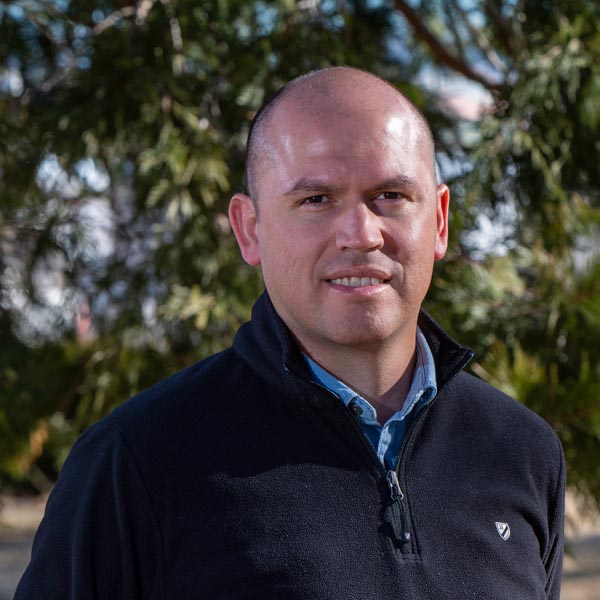
Alejandro Andrade-Rodriguez
Andrade-Rodriguez’s research focuses on irrigation management practices specific to Nevada. Recently, he has been working with Walia, Yerka and Washington-Allen to identify how sorghum responds to different nitrogen and irrigation treatments.
Supporting farm-to-table, sustainable agriculture
"We want to adapt new sorghum hybrids to specific regions to support farm-to-table production of unique varieties and flavors that also contribute to reducing water use in agriculture relative to other crops like alfalfa and corn." -Assistant Professor Melinda Yerka
Improving health by studying gut bacteria
Assistant Professor Steven Frese is conducting research on gut microbiomes
Hannah Alfaro
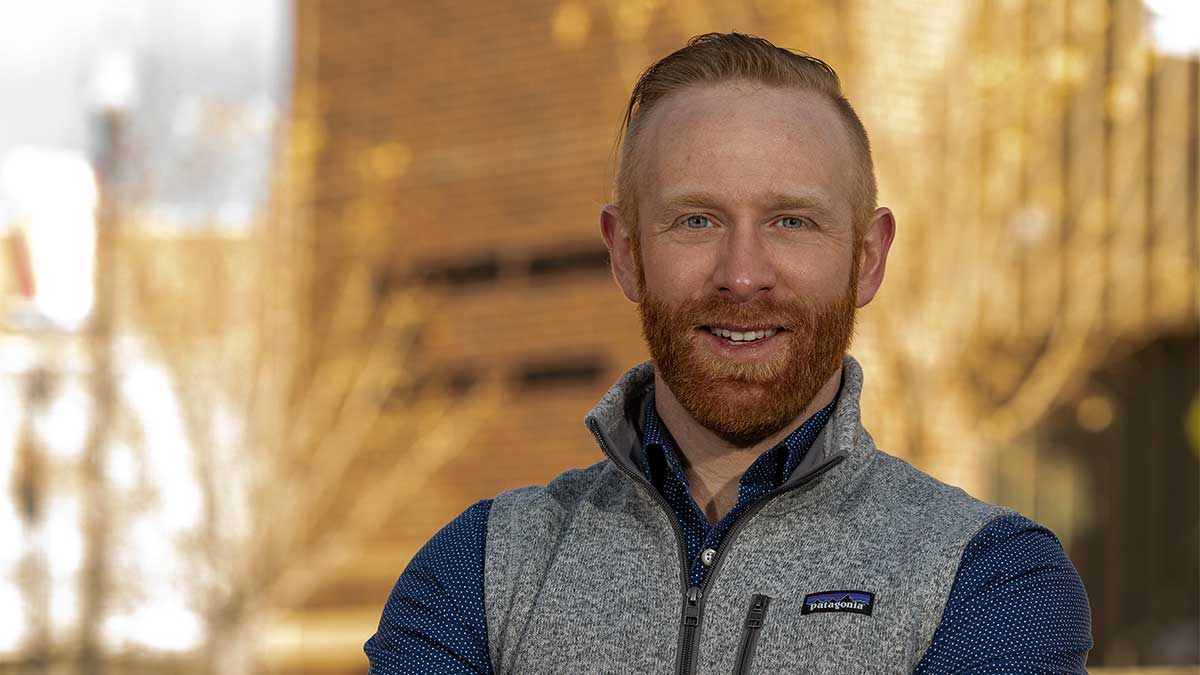 Steven Frese is researching bacteria in human guts to inform healthier diets. Photo by Robert Moore.
Steven Frese is researching bacteria in human guts to inform healthier diets. Photo by Robert Moore.
Steven Frese, a new assistant professor for the University is researching how the relationship between humans and the microbes in their gut can give insight into digestion, health, infections and nutrition.
Frese is studying how diet affects the interactions between humans and bacteria, specifically in the gut microbiome, which is the bacteria, viruses, protozoa and fungi, as well as their collective genetic material, present in the gastrointestinal tract. As part of the College's Department of Nutrition, Frese’s goal is to develop technology and therapies that can improve health and nutrition, and bring these discoveries and innovations to practice in the health care and food industry.
Frese's recent findings include that:
- In the United States, Bifidobacterium bacteria was less abundant in infants than expected.
- Breastfeeding promotes the abundance of Bifidobacterium in the infant gut microbiome.
- Infants with higher levels of Bifidobacterium had lower levels of antibiotic resistance genes in their microbiome.
- Bifidobacterium shapes the development of the immune system and reduces inflammation during an important developmental window.
- Preterm infants who received the probiotic B. infantis EVC001:
- Had reduced risk for disease and reduced inflammation in the gut.
- Developed gut microbiomes similar to those found in healthy full-term babies.
- Were substantially better off.
Helping babies, improving health
"There’s been a lot of work in the field showing that different kinds of probiotics can be good for infants and that some don’t have any effect at all. When I see how microbial communities interact with someone’s diet, it gives me clues on how to change a diet to improve overall health. We can use these lessons from the gut microbiome to actively change and improve the food we consume." -Assistant Professor Steven Frese
4-H helps schools teach STEAM, civic engagement, and health and nutrition
Tiffany Kozsan
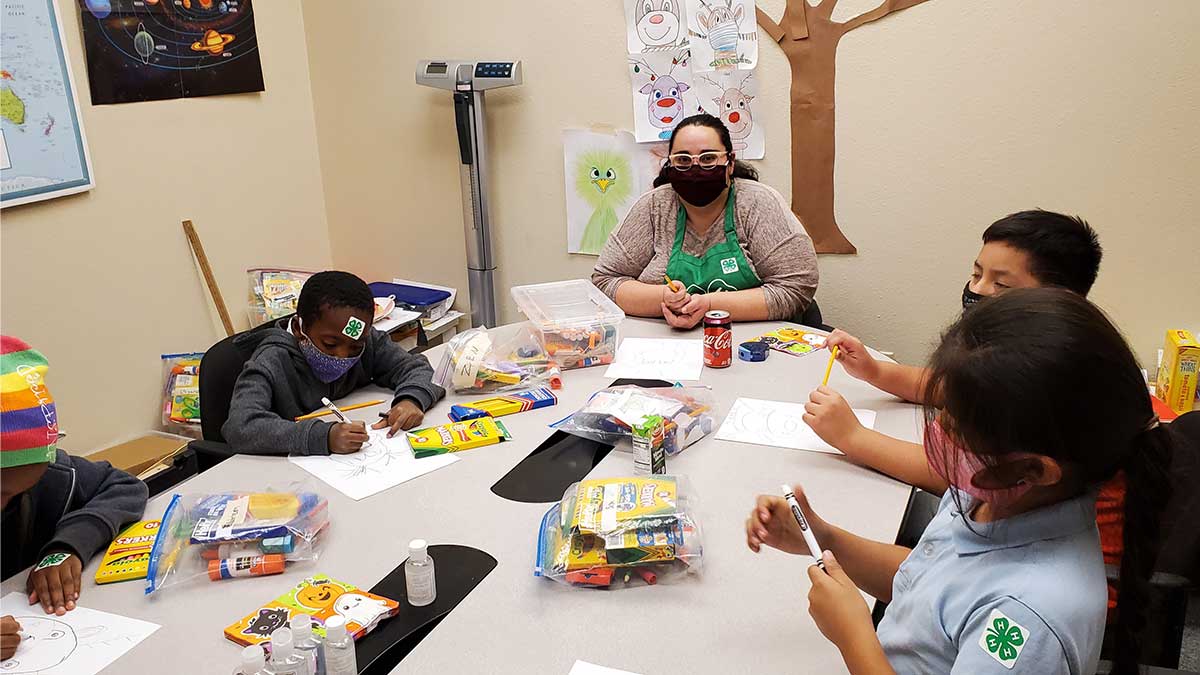 4-H youth at the Women and Children’s Center of the Sierra practice listening as they do a directed draw of a reindeer. Photo by Pam Russell, Women's Center of the Sierra.
4-H youth at the Women and Children’s Center of the Sierra practice listening as they do a directed draw of a reindeer. Photo by Pam Russell, Women's Center of the Sierra.
In recent years, Title I schools in Nevada have made a special effort to enhance student achievements in reading and math. As a result, not as much emphasis is placed on STEAM, (science, technology, engineering, art and math), civic engagement, and health and nutrition. To help support the schools and bridge the gap in education, Extension’s 4-H Youth Development Program has partnered with several school districts to bring additional educational opportunities to students through the 4-H AfterSchool Program.
Teaming up with TEAM UP
For over a decade, Washoe County School District's Together Everyone Achieves More Utilizing Programs (TEAM UP) has used 4-H curriculum to provide experiential-based learning activities in Title I schools in the Reno area.
"4-H has been the most valuable partner that we have providing services in terms of enrichment programming," Denise Benson, TEAM UP coordinator, said. "Our students absolutely love it. They look forward to the programming that Extension offers."
STEAMing into school breaks and community support
After school is not the only time students can engage with enrichment activities offered by the 4-H AfterSchool Program. 4-H staff also partner with schools to offer STEM in the classroom and STEAM day camps during summer and school breaks.
"Extension's program adds to our ability to help families," Pam Russell, executive director for the Women and Children’s Center of the Sierra in Washoe County, said. "Kids are having fun learning and getting individual attention from the amazing 4-H team. We really truly appreciate having this opportunity for our kids and our families, because it's fantastic."
Growing leadership, citizenship and life skills
4-H is a community of young people across America. Members learn life skills, make new friends, enhance self-esteem, achieve personal goals, develop positive relationships with peers and volunteers, and have fun learning and sharing as a family and a club.
New doctoral program launches in natural resources & environmental science
University responds to growing need for more advanced science and skills to manage natural resources and environmental challenges
Claudene Wharton
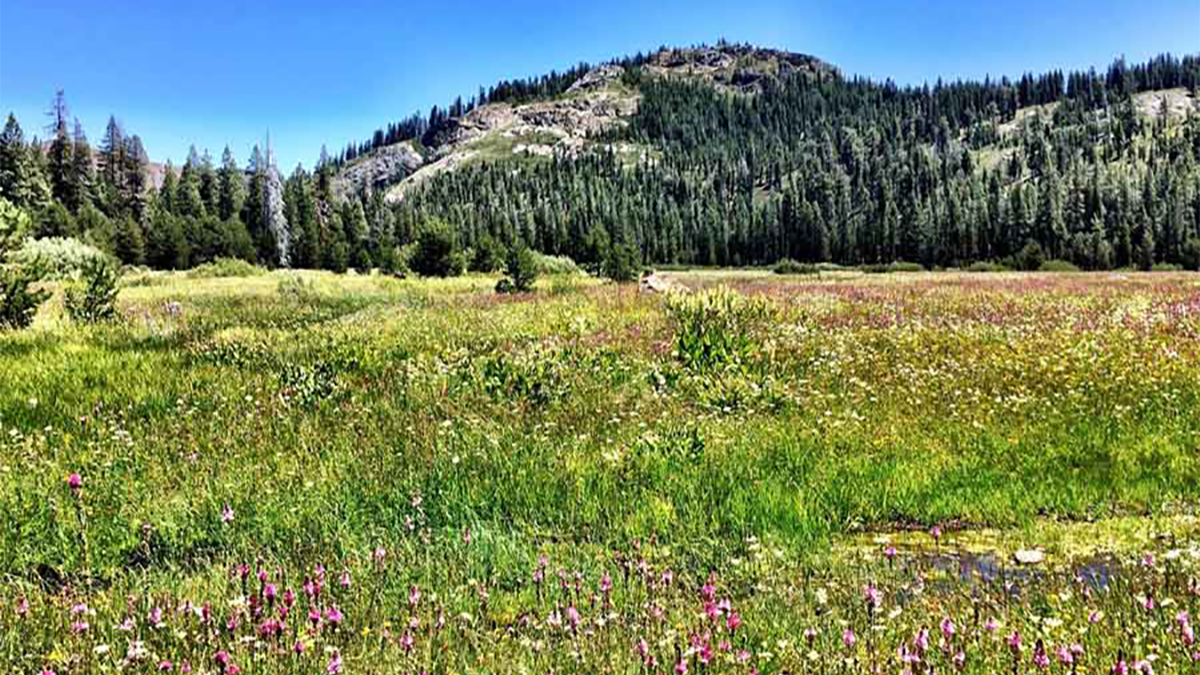 The new Doctoral Program in Natural Resources & Environmental Science will prepare graduates to help inform management of valuable natural resources, such as this Sierra Nevada meadow. Photo by C.C. Reed.
The new Doctoral Program in Natural Resources & Environmental Science will prepare graduates to help inform management of valuable natural resources, such as this Sierra Nevada meadow. Photo by C.C. Reed.
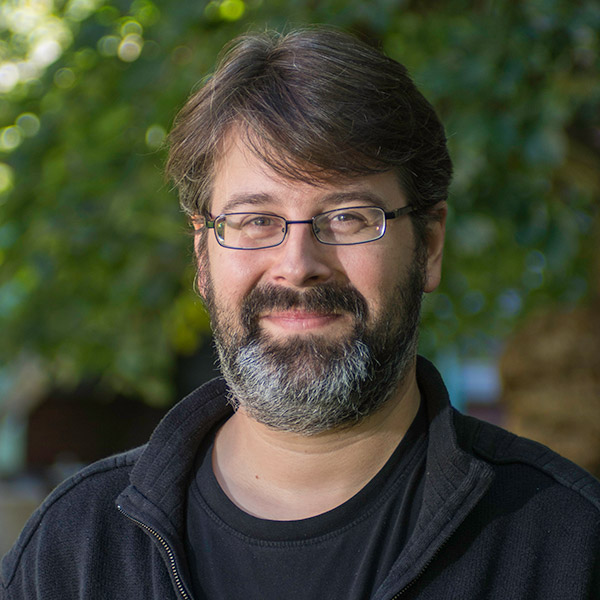 Jonathan Greenberg.
Jonathan Greenberg.Natural resource management and environmental science are fundamental to the production of food, fuel and fiber, as well as guaranteeing water and air quality, and for the sustainability of ecosystems. Yet, in Nevada, there has been no doctoral degree program to provide the state with the type of advanced knowledge, research and skills needed to help address the complex challenges the state faces in balancing uses of and managing important resources such as water, forests, wildlife and other Great Basin ecosystems. Until now.
This fall, our College will launch the University's new Doctoral Program in Natural Resources & Environmental Science. The program is designed to train experts in "translational science," which moves beyond interdisciplinary, cross-cutting research to include stakeholders and land managers throughout the entire research process – from project initiation, through publication of the research, and into the communication of findings to the nonacademic community to have immediate and lasting impact in the real world.
"We developed the Ph.D. program with the goal of preparing students to address critical regional and global needs in applied natural resource ecology and management, as well as more broadly in the field of environmental science," said Jonathan Greenberg, associate professor in the department, and the program’s director. "We also wanted to develop a program that represents the full diversity and cross-cutting nature of the research being performed by faculty within the department."
Meaningfully impacting our state, country and world
"This degree program is inherently multidisciplinary and capitalizes upon the broad spectrum of expertise offered by our nationally recognized faculty in natural resources and environmental science. There is no question in my mind that this program will have meaningful impact not only in Nevada, but in other places in the country, and across the globe." -College Dean Bill Payne
Extension volunteers are an integral part of the team
Volunteer Development Coordinator Cheryl Coleman brings her expertise to Extension
Hannah Alfaro
 Cheryl Coleman.
Cheryl Coleman.Extension recently welcomed Cheryl Coleman to the Clark County - Las Vegas office as the volunteer development coordinator.
Coleman is working to innovate Extension’s volunteer management system, including policies, best practices and procedures, that will be consistent across programs and include a focus on diversity management and developing and engaging volunteers in rural areas. The system will help Extension programs, including 4-H Youth Development and Master Gardeners, with volunteer management practices while also giving volunteers the opportunity to pursue their own interests in a healthy and fun environment.
Coleman is writing a standard operating procedures manual for faculty and staff who work with volunteers. The manual will identify where volunteer management could be strengthened, inform faculty and staff on volunteer management-related issues, and ensure that all volunteer-related programs are adhering to University and national guidelines.
Empowering volunteers to help Nevada communities
"I want to help programs understand how volunteers can be important members of their team. I want to challenge previous notions of volunteers playing menial roles and demonstrate that when a solid volunteer management system is in place, volunteers can effectively, as well as efficiently, contribute to Extension’s mission, objectives and goals." -Volunteer Development Coordinator Cheryl Coleman
Growing a stronger Nevada
Our programs work together to make an impact
Our teaching, research and engagement programs are intertwined and complement one another. Faculty who teach on campus also conduct research as part of our Experiment Station, allowing students to learn about and participate in research. Extension faculty engaging with communities identify research needs, as well as join Experiment Station faculty to conduct research. Faculty on campus help to develop Extension programs in communities.
